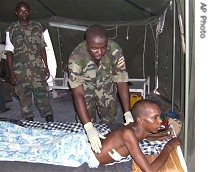-
(单词翻译:双击或拖选)
Nairobi
29 June 2007
In the semi-autonomous region of Puntland in Somalia, a swarm1 of locusts3 has stripped fruit trees and crops, causing an agricultural emergency in a country already suffering acute food shortages. Arjun Kohli reports from our East Africa Bureau in Nairobi.
Worried officials in the northeastern area of Puntland say locusts have already eaten their way through hundreds of hectares of farmland.
An unusually heavy rainfall in the Horn of Africa in recent weeks caused dormant4 eggs in the soil to hatch. The locust2 swarm, which can number in the tens of millions, has reportedly devastated5 the Bari region's lush fruit orchards6, sending prices for mango, oranges, bananas, and other fruits skyrocketing in local markets.
Scientists from the Desert Locust Control Agency for Eastern Africa are working with the U.N. Food and Agricultural Organization to combat the attack.
The FAO's coordinator7 for Somalia, Graham Farmer, tells VOA that he believes a particularly destructive species called the immature8 desert locust is to blame for the infestation9.
The FAO has reported simultaneous locust outbreaks in Eritrea, Saudi Arabia, Sudan, and Yemen, and Farmer says he fears the swarm could make its way as far as the Indian subcontinent.
"They go through different phases and then eventually they reach the phase where they can fly," said Farmer. "The conditions have been right for this to happen at this time. Depending on the way the wind blows, it can be Ethiopia, Eritrea, Yemen, Sudan, Pakistan, India. So, [there is] very much the potential for a regional problem."
Puntland's agriculture ministry10 says it is powerless to stop the insects and has asked for international assistance.
Meanwhile, aid agencies say insecurity, frequent pirate attacks, and closed borders with Kenya are severely11 hampering12 efforts to deliver food and other supplies to Somalis suffering from conflict and drought in other parts of the country.
 |
| A man wounded in a explosion in Mogadishu is attended to by doctors of UN Ugandan peacekeepers, 28 Jun 2007 |
"There has been an increase in attacks, attacks involving hand grenades and explosive devices," said Olin. "This is making it extremely hard for U.N. national staff and Somali NGOs and international NGOs through their national staff to provide assistance in Mogadishu. The situation in Mogadishu is poor and it has deteriorated15 in the last week."
A Somali worker for a Western aid agency and his driver were shot to death in Mogadishu late Wednesday in what appears to have been clan-related violence.
 收听单词发音
收听单词发音
1
swarm

|
|
| n.(昆虫)等一大群;vi.成群飞舞;蜂拥而入 | |
参考例句: |
|
|
|
2
locust

|
|
| n.蝗虫;洋槐,刺槐 | |
参考例句: |
|
|
|
3
locusts

|
|
| n.蝗虫( locust的名词复数 );贪吃的人;破坏者;槐树 | |
参考例句: |
|
|
|
4
dormant

|
|
| adj.暂停活动的;休眠的;潜伏的 | |
参考例句: |
|
|
|
5
devastated

|
|
| v.彻底破坏( devastate的过去式和过去分词);摧毁;毁灭;在感情上(精神上、财务上等)压垮adj.毁坏的;极为震惊的 | |
参考例句: |
|
|
|
6
orchards

|
|
| (通常指围起来的)果园( orchard的名词复数 ) | |
参考例句: |
|
|
|
7
coordinator

|
|
| n.协调人 | |
参考例句: |
|
|
|
8
immature

|
|
| adj.未成熟的,发育未全的,未充分发展的 | |
参考例句: |
|
|
|
9
infestation

|
|
| n.侵扰,蔓延 | |
参考例句: |
|
|
|
10
ministry

|
|
| n.(政府的)部;牧师 | |
参考例句: |
|
|
|
11
severely

|
|
| adv.严格地;严厉地;非常恶劣地 | |
参考例句: |
|
|
|
12
hampering

|
|
| 妨碍,束缚,限制( hamper的现在分词 ) | |
参考例句: |
|
|
|
13
coordination

|
|
| n.协调,协作 | |
参考例句: |
|
|
|
14
humanitarian

|
|
| n.人道主义者,博爱者,基督凡人论者 | |
参考例句: |
|
|
|
15
deteriorated

|
|
| 恶化,变坏( deteriorate的过去式和过去分词 ) | |
参考例句: |
|
|
|















